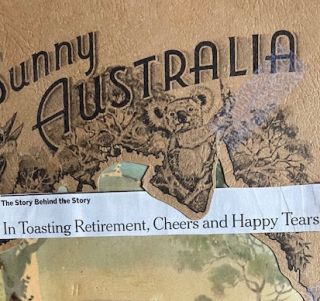Aging
Are You the Sum of What You Do, or Just a Decent Person?
Personal Perspective: What they don’t talk about at the retirement party.
Posted May 17, 2024 Reviewed by Ray Parker
Key points
- You leave more behind than just a job when you retire.
- Stepping away from what you do is a bit like stepping away from who you are in life.
- How do you want to define yourself in your retirement?
- Who do you want to be next?

You know the drill. When meeting someone for the first time, shortly after, hello, my name is, comes the question: What do you do?
It seems like a logical question and hardly feels invasive, except maybe it is.
When we lived in Australia, we discovered that people don’t ask you what you do in the doctor, lawyer, mechanic, artist, teacher, bus driver, or plumber scheme of things. It is thought to be downright rude (so is asking about someone’s marital status). Australians believe that your occupation or marital status doesn’t necessarily make you a good person or a bad person. What matters most is whether or not you’ll be a good friend: a good mate.
It took us a bit of time to break the habit of asking about someone’s occupation or marital status, to find new ways to say hello and get to know folks on a more personal level. But that’s not what this post is about.
It is about who you think you are because of what you do.
Status Matters Until It Doesn't
Which brings me to the retirement party.
Here’s what the human resources (HR) department doesn’t tell you and your coworkers attending your retirement party: when you leave your profession/job, you leave a major piece of your identity behind.
Whether we want to admit it or not, we put great stock in being able to say we are this or that. No matter what kind of work we do, there is a sense of identity in that work. It’s a big chunk of who we are and how we view ourselves.
There are other chunks as well, like wife, husband, mother, father, grandmother, grandfather, gardener, or golfer. Make a list and see what you put first on your list of who you are: don’t think about what you should say; just think about what you usually say when someone asks.
My husband usually identifies himself as a retired university professor, which he is. However, when pressed about what he’s doing in retirement, he goes on to say he plays the violin, then quickly shifts to saying he participates in a labor discussion group (his area of research concerns labor unions) and leads another discussion group about current events.
It’s easy to hold on to who you were.
But What About Being Someone Completely Different?
I believe my husband has made a good leap from a college professor to a retired professor. Leaving his university position didn’t close his door to learning, but it opened it wider. He has a newly found freedom to read broadly to his heart’s content and talk with like-minded folks about it.
But I know many people who struggle with letting go of one thing and moving on to the next.
For many, myself included, letting go of one thing that identifies who we are in order to discover what we’d really like to do next that’s completely different is a process of not only letting go but also grieving a little.
OK, grieving a lot.
Some of that grieving comes from wondering if we were good enough, did enough, or could have done more. You know what I’m talking about.
I’d like to say, the past is past, and get over it. But it’s not that easy.
What Do You Do if There's No HR Department?
I have come to realize there is something very useful about having an HR department. They have a well-developed process of paperwork and steps you need to take to go from working to not working. All that paperwork is a rite of passage that helps get you out the door and on your way with your retirement money in hand.
I’ve always loved the variety of work being a freelance writer has given me. It’s been a rich life, but there’s no freelance HR department, no paperwork to fill out, no final monthly paycheck to get me out of one life and on to the next.
Then, there’s that whole scary question of if I’m not a writer, dancer, artist, violin maker, singer, musician, or small business owner, who or what am I?
Anyone who has enjoyed a self-employed life understands all too well that when you retire, there’s more to let go of than just a desk by a window or a job title. Often, there’s a company to sell, final jobs to finish, and longtime customers to call to say you won’t be doing this or that for them anymore.
It’s a more gradual process with a long slide to winding down and getting out the door, all the while trying to figure out where you’re going next.
Oh, and who you’ll be when you get there?
If I quit writing, can I say I’m a retired writer? Is there even such a thing?
Which brings me back to the Aussies: What matters is that you’re a good mate, a decent friend.
I hope I can be that.




